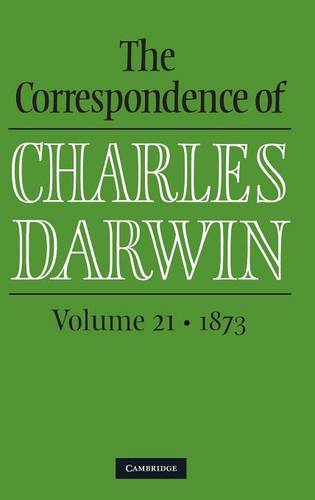
The twenty-first volume of Charles Darwin’s correspondence comprises all the surviving letters both from and to Darwin from the year 1873.
During this year, Darwin continued to deal with correspondence resulting from the publication the previous year of The Expression of the Emotions in Man and Animals. 1873 also saw him beginning to revise The Descent of Man with the help of his son George. But most of Darwin’s efforts during the year came from the resumption of his botanical studies into insectivorous plants and pollination.
Highlights from Darwin’s correspondence for 1873 include:
- Darwin expressing some scepticism over Francis Galton’s plans for a register of naturally gifted individuals, while stating ‘the object seems a grand one’.
- Darwin (who was extremely prone to scope-creep in his projects) realising “I must remember that I am growing old, otherwise I shd. go on forever with Drosera as I did with barnacles”.
- Darwin writing on the relative importance of external conditions and natural selection in causing new adaptations.
- Darwin thanking Alfred Russel Wallace for reviewing The Expression of the Emotions in Man and Animals while standing his ground regarding Wallace’s criticisms. In reply, Wallace concedes he might be wrong on some points.
- Darwin adding his name to a petition to the Chancellor of the Exchequer, William Gladstone, urging that the herbarium and library at Kew Gardens not be moved to the new Natural History Museum (as proposed by Richard Owen).
- Darwin defending his view that all existing human languages could be “derived from a common stock, far more simple or less developed than any one now spoken”.
- Darwin forwarding an account to the journal Nature of a family of dogs all scared of butchers.
- Darwin later sending Nature an anecdote of a coach-horse that had gone blind, but still stopped at public houses. He believes his own horse might have a homing instinct, and marvels at the homing instinct of turtles at Ascension Island.
- Darwin describing Dionaea (the Venus fly-trap) as “the most wonderful plant in the world”.
- Darwin asking John Scott Burdon Sanderson to investigate possible (nerve-like) electric currents in Dionaea. (Sanderson was so excited at detecting such currents that he telegraphed Darwin with the news.)
- Darwin’s fan letter to Thomas Wentworth Higginson, commander of a ‘black regiment’ during the U.S. Civil War. (They had previously met, but Darwin hadn’t known about Higginson’s former role.)
- Darwin, having discovered a women’s suffrage supporter intends to present a petition to the House of Commons on which Darwin’s is the only signature, asking for his name be erased unless other signatures are added.
- Darwin writing to Marian Evans (George Eliot), asking if it would be all right for his daughter to call at her home. (In a postscript, he says his wife has complained that he hasn’t asked if they might call as well, “but I tell that I still have some shreds of modesty”.) See also Evans’s reply.
- Darwin providing some information about giant tortoises collected from the Galápagos Islands during the Beagle voyage.
- Darwin writing an affectionate letter to Thomas Henry Huxley, explaining that eighteen of Huxley’s friends have organised a collection for him to help him out of his financial difficulties.
- Huxley’s overwhelmed, grateful reply, in which he admits he had been having a nervous breakdown, going on to say, “Have I said a word of appreciation for your own letter? I shall keep it for my children that their children may know what manner of man their father’s friend was & why he loved him.”
- Darwin referring to himself as (recently widowed) geologist Charles Lyell’s “old & true disciple”.
- In response to a questionnaire sent to noted scientists by Francis Galton, Darwin attempting to assess his own talents and influences.
- Darwin being sent an anecdote of supposed spontaneous generation of life in rotten Easter eggs!
- Darwin sending comments on a book about hay-fever, politely pointing out to the author that he might not be fully aware that wind- and insect-pollinated plants have different types of pollen. (See also. the author’s reply.)
- Darwin’s son Francis sending an account of himself and his fiancée counting the nectar holes made in flowers by bees.
- Darwin agreeing for his name to be included among patrons of a cat show, but jokingly advising against it on the grounds that “people may refuse to go & admire a lot of atheistical cats!”
- Darwin’s famous letter to Karl Marx, thanking him for sending a copy of Das Kapital. (For more on this letter, see my FAQ article Didn't Karl Marx offer to dedicate Das Kapital to Darwin?.)
- Darwin writing to his son George, urging him to reconsider before publishing an essay on religion.
- Darwin admitting, “It is precious easy to suggest experiments, & often most difficult, as I know to my cost, to carry them out.”
- George Darwin’s account of attending a séance.
- The new local vicar objecting to Darwin’s application for the continued use of the school room as a working men’s reading room.
As with all the volumes in this series, this book is really aimed at people with a serious interest in Charles Darwin. As with all the other volumes, every letter is annotated with meticulously researched footnotes explaining its context and references. The series as a whole is a masterpiece of scholarship.
- Buy this book from Bookshop.org (UK) and help tax-paying, independent bookshops.
- Buy this book from Amazon.co.uk
- Buy this book from Amazon.com